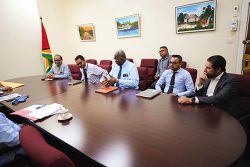Forget about the Deepwater Horizon. If Nicaragua’s $50 billion transoceanic canal scheduled to start construction on December 22 becomes a reality, it could be the world’s biggest environmental disaster in recent memory.
That’s the conclusion of many environmental experts upon hearing the first detailed public presentation of the Pharaonic project by Nicaraguan President Daniel Ortega and Chinese consortium HKND to build a new waterway that would compete with the Panama Canal. The mega-project was reportedly negotiated with HKND by Laureano Ortega, the president’s son, who is acting as the government spokesman on the issue.
Ecologists are appalled, among other things, by the fact that construction will start next month without any serious environmental impact study.
 At the November 20 public presentation of the project in the Nicaraguan capital, Laureano Ortega announced that construction will start December 22. But officials in charge of doing the project’s environmental studies conceded that a full report on its possible environmental impact won’t be finished until April 2015.
At the November 20 public presentation of the project in the Nicaraguan capital, Laureano Ortega announced that construction will start December 22. But officials in charge of doing the project’s environmental studies conceded that a full report on its possible environmental impact won’t be finished until April 2015.
More than 10 Nicaraguan environmental groups, united under an umbrella organization known as the Grupo Cocibolca, after the native name of the Nicaragua Lake, issued a communique after the government’s public briefing demanding that the start of the public works be postponed.
Among other reasons, the group argues that the government-ordered environmental study won’t be released until April, that no independent study has been commissioned, and that — unlike what Panama did recently before authorizing the expansion of the Panama Canal — there has been no public referendum asking the Nicaraguan people whether they want the transoceanic waterway.
Jaime Incer Barquero, a respected former Nicaraguan environment minister and university professor who is nominally an environmental adviser to Ortega, told me in a telephone interview that the Nicaragua canal project is “a foretold disaster.”
“It will lead to the contamination and death of aquatic life in Lake Nicaragua, which is Latin America’s biggest tropical lake,” Incer Barquero said. “It will also mean that the Nicaragua Lake may lose forever its capacity to provide potable water to all of Nicaragua, including the capital.”
The planned transoceanic waterway will require the dredging of an area of about 64 miles across Lake Nicaragua, which will release millions of tons of mud and other sediments.
That will pollute the water of the entire lake, depleting oxygen and killing fish and other aquatic species, he said.
Asked whether, as a presidential adviser, he has submitted his concerns to President Ortega, Incer Barquero said “the president is unreachable, even for his ministers. All public issues are channelled to the first lady, who has other priorities.” Translation: the Ortega government is not paying attention to critics among its own advisers.
Many international experts agree with the Grupo Cocibolca’s positions. A group of 15 international environmental experts who participated in a two-day conference convened by the Central American University (UCA) and the Nicaraguan Academy of Sciences, among other institutions, concluded that the Nicaragua Canal project should not start without a proper environmental impact study, Nicaragua’s Confidencial magazine reported.
The group of foreign experts, which included US, Danish and Brazilian scientists, shared the local environmentalist groups’ concerns about the possible destruction of Lake Nicaragua as a result of the massive dredging required to allow the passage of big ships. The foreign experts’ group said that Nicaragua “should follow internationally accepted common practices for megaprojects,” the magazine reported.
My opinion: Nicaragua’s transoceanic waterway, for which Ortega’s authoritarian government has granted China’s HKND a 50-year concession to build the canal, with an option to run it for an additional 50 years, has been a murky project from the start.
It’s not only a rare concession of national sovereignty to a previously little-known foreign firm for the next 50 years, awarded without a national referendum or proper oversight by a president who controls all branches of government, but is also a dubious project in its financial, engineering and environmental aspects.
When the Nicaragua Canal project was first announced last year, we said in this column that it will either be Latin America’s most ambitious engineering project in recent history, or one of the region’s biggest financial scams.
Now, as the project is scheduled to start next month without official or independent environmental impact studies, we have to add that — if it really gets off the ground — it may also be one of the region’s biggest environmental threats.
© The Miami Herald, 2014. Distributed by Tribune Media Services.







